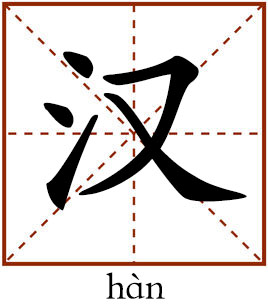Han

This character has various meanings. It often refers to the Han Chinese, a racial group in China that derives its name from the Han Dynasty. Therefore, the Chinese language is generally called han yu. Additionally, it can be used as an address for adult men.
身在曹营心在汉
shēn zài cáo yíng xīn zài hàn
Shen refers to body and zai is “in” or “at.” Cao ying is known as the immediate military camp of the famous warlord, Cao Cao (155–220). Xin is heart and han refers to the Eastern Han Dynasty. This idiom literally means that one is living in Cao’s camp but one’s heart is still with the Han. It usually depicts a person who is in one place while still longing to be somewhere else.
This idiom originates from the 14th-century historical novel, Romance of the Three Kingdoms by Luo Guanzhong. In 199, Liu Bei (161–223), a warlord in the late Eastern Han Dynasty who founded the state of Shu Han, seized control of Xuzhou (one of the 13 provinces of the Han Dynasty). He moved to Xiaopei (present-day Pei County, Jiangsu Province) and left his general Guan Yu in charge of the provincial capital. In 200, Liu was defeated by Cao and fled to northern China. Guan was captured by Cao’s forces and brought back to Xuzhou. Cao treated Guan respectfully and asked Emperor Xian, Liu Xie, to appoint Guan as a Lieutenant-General. Although Cao admired Guan’s character, he also sensed that Guan had no intention of serving under him for long. He asked Zhang Liao, one of his military generals, “Why don’t you make use of your friendship with Guan Yu to find out what he wants?” When Zhang asked him, Guan replied, “I am aware that Lord Cao treats me very generously. However, I have also received many favors from Liu and I have sworn to follow him until I die. I cannot break my oath.” Finally, Guan sealed up all the gifts he received from Cao, wrote a farewell letter, and headed to find Liu.
Guan Yu’s life was lionized and his achievements glorified to such an extent after his death that he was almost deified during the Sui Dynasty. His deeds and moral qualities have been given immense emphasis, making himself one of East Asia’s most popular paradigms of loyalty and righteousness.
edited by REN GUANHONG

 PRINT
PRINT CLOSE
CLOSE